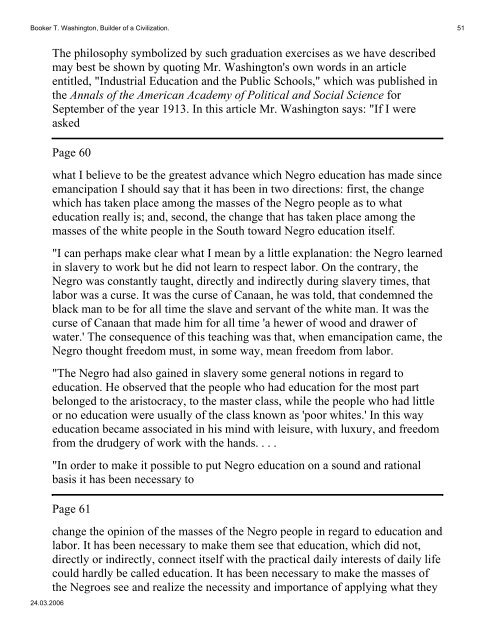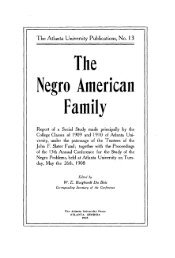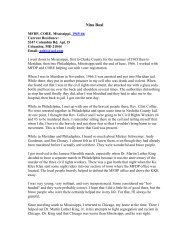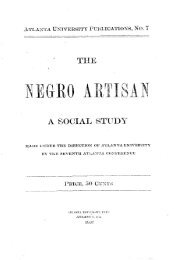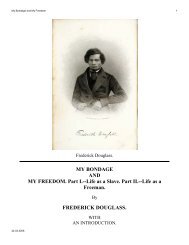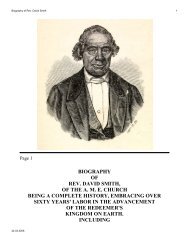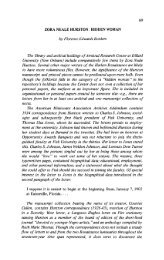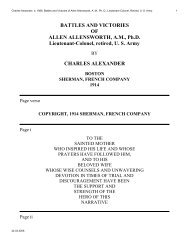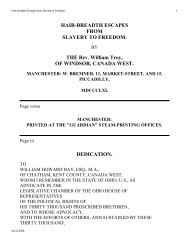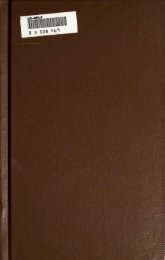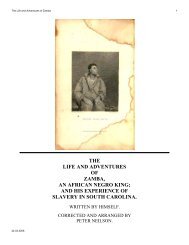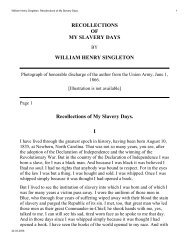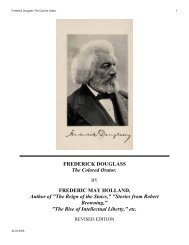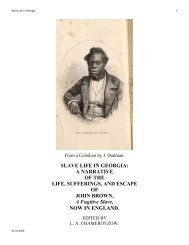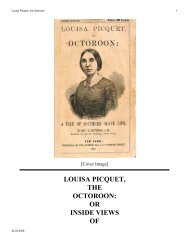Booker T. Washington, Builder o - African American History
Booker T. Washington, Builder o - African American History
Booker T. Washington, Builder o - African American History
You also want an ePaper? Increase the reach of your titles
YUMPU automatically turns print PDFs into web optimized ePapers that Google loves.
<strong>Booker</strong> T. <strong>Washington</strong>, <strong>Builder</strong> of a Civilization. 51<br />
24.03.2006<br />
The philosophy symbolized by such graduation exercises as we have described<br />
may best be shown by quoting Mr. <strong>Washington</strong>'s own words in an article<br />
entitled, "Industrial Education and the Public Schools," which was published in<br />
the Annals of the <strong>American</strong> Academy of Political and Social Science for<br />
September of the year 1913. In this article Mr. <strong>Washington</strong> says: "If I were<br />
asked<br />
Page 60<br />
what I believe to be the greatest advance which Negro education has made since<br />
emancipation I should say that it has been in two directions: first, the change<br />
which has taken place among the masses of the Negro people as to what<br />
education really is; and, second, the change that has taken place among the<br />
masses of the white people in the South toward Negro education itself.<br />
"I can perhaps make clear what I mean by a little explanation: the Negro learned<br />
in slavery to work but he did not learn to respect labor. On the contrary, the<br />
Negro was constantly taught, directly and indirectly during slavery times, that<br />
labor was a curse. It was the curse of Canaan, he was told, that condemned the<br />
black man to be for all time the slave and servant of the white man. It was the<br />
curse of Canaan that made him for all time 'a hewer of wood and drawer of<br />
water.' The consequence of this teaching was that, when emancipation came, the<br />
Negro thought freedom must, in some way, mean freedom from labor.<br />
"The Negro had also gained in slavery some general notions in regard to<br />
education. He observed that the people who had education for the most part<br />
belonged to the aristocracy, to the master class, while the people who had little<br />
or no education were usually of the class known as 'poor whites.' In this way<br />
education became associated in his mind with leisure, with luxury, and freedom<br />
from the drudgery of work with the hands. . . .<br />
"In order to make it possible to put Negro education on a sound and rational<br />
basis it has been necessary to<br />
Page 61<br />
change the opinion of the masses of the Negro people in regard to education and<br />
labor. It has been necessary to make them see that education, which did not,<br />
directly or indirectly, connect itself with the practical daily interests of daily life<br />
could hardly be called education. It has been necessary to make the masses of<br />
the Negroes see and realize the necessity and importance of applying what they


